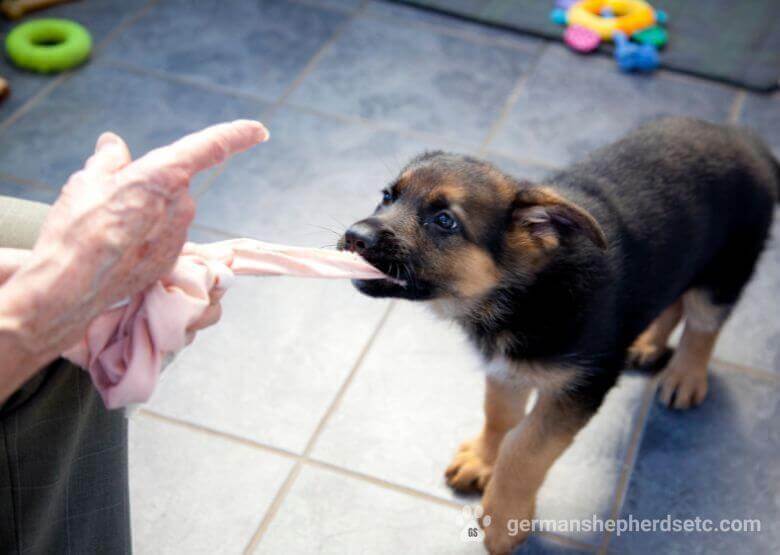Table of Contents
If your German Shepherd dog is properly trained, you can establish closer bonds with it and feel calm and happy with this courageous and reliable friend. The German Shepherd is a remarkable breed, and appropriate training can bring to life its best traits.
German Shepherds are clever and hard-working dogs. They can learn very quickly, so they are easy to train. They strive for equal partnership, too. However, no matter how loyal and brave your dog can be, it is also super sensitive. So, it needs clear goals and loving guidance. There are some essential things you need to know before you start your German Shepherd puppy training, depending on the age. We have compiled a lot of useful information for you in this article.
What Do You Need to Know Before You Start Training a German Shepherd Puppy?
The first question new dog owners usually ask is at what age it is better to start training a German Shepherd puppy. It may sound too harsh, but training should start from the very first steps of a puppy in your house. In fact, the younger your puppy is, the better results from training you will get. Young pups are prone to learning everything at an early age, so all you want to teach them will be acquired successfully.
The next question is about the basic skills you need to teach your puppy and what you can start with. The range of skills depends on what you want your dog for. However, there are some important things you need to know about your dog to make training more successful. So, these are the main characteristic features of this amazing breed:
- German Shepherds are pretty hard-working and immensely trainable.
- These dogs tend to build strong bonds with one person, so you need to involve all the family in the process of training to help the dog treat everybody equally.
- The animals are very loyal, and their personalities are usually strong and straightforward.
- The German Shepherd is a large breed, so it has to be manageable because untrained dogs can be dangerous to strangers.
- They have a strong herding and guarding instinct, so you need to prevent them from chasing living objects and barking all the time.
- German Shepherds are amazingly energetic, so they need a lot of exercises all the time. These animals will never become family toy dogs or couch potatoes.
- These puppies need a lot of socialization and exposure to new experiences. Actually, the period for their socialization is even shorter than in other breeds.
- German Shepherds need a lot of mental stimulation and space for running and exploring the world. So, a little cabin in the woods will feel much better for them than a luxurious apartment in the center of a crowded city.
- Their sense of smell is impressive, so they prefer to play games connected to searching or tracking.
- A German Shepherd is not afraid of any weather conditions, so it can be happy when it gets immensely dirty in the mud, and even if it is freezing, the dog is still joyous and active.
- This dog loves to be treated positively and encouraged for good behavior with tasty things.
- Your German Shepherd may be pretty sensitive and feel lonely and abandoned when you leave it for half an hour, and separation-related psychological problems can emerge if it is left alone for the whole day. Try to avoid it.
Why Is Socialization Important?
The answer to the question ‘How to train a German Shepherd puppy?’ starts with socialization practices. The period when your GS puppy can be socialized effectively is called a socialization window. At this time, it wants to learn a lot about the world around it. This period does not last too long, but it can influence the entire dog’s life.
This time is also characterized by one section called ‘The Fear Period’. It is important for a puppy because it learns how to deal with hazards and threats. They can include loud sounds, unfamiliar objects, new people, or kids. The Fact is that GS puppies are more afraid of new objects than representatives of other breeds. That is why they need to be socialized as soon as possible.
These tips may help you to start socialization and be successful:
- Ask the breeder you have taken your puppy from what they had been doing about socialization before you adopted your little friend.
- Use special exercises described in many manuals and materials you can access.
- Try to walk your puppy from the first days of staying with you, but do it safely before it is vaccinated.
- Let your puppy explore the territory and all the available surfaces.
- If you do not want to expose it to microbes and other harmful influences during the first days in your home, use a stroller or a bag to take the puppy outside and let it learn something about the world.
How Can You Train a German Shepherd Puppy?
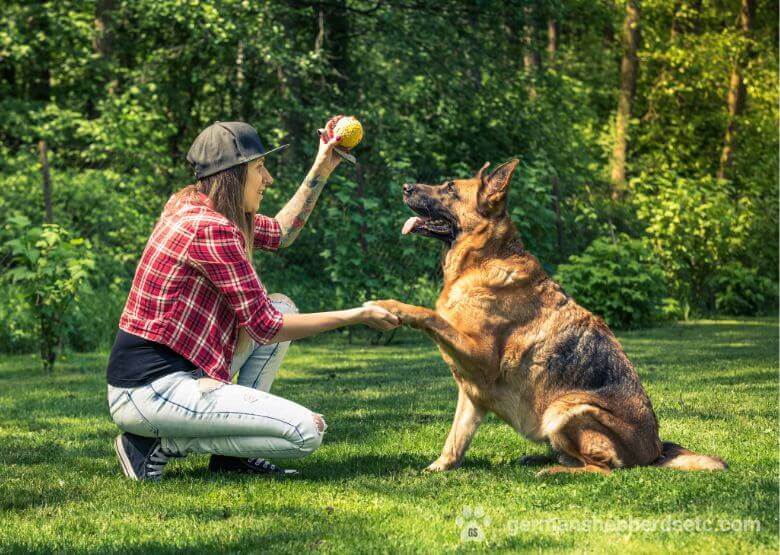
Many will tell you that it is too early to start training a German Shepherd puppy at the age of 8-12 weeks. Though, it is not. You can start training, of course, but with a lot of positive reinforcement to help it get rid of bad habits and improper behavior. Actually, you have to start training as soon as your little one arrives at your home.
Here are some important principles you need to follow if you want to start training your GSD puppy early.
- Be Consistent
First, you need to find out what you should do. Never start training if you do not know the essentials. Develop a list of rules for your pup and follow them as soon as you bring your little doggy home. You need to show it what kind of behavior is not acceptable in your house.
If you are not consistent and don’t keep the rules yourself, your puppy will feel confused and continue practicing its bad behavior. For example, if your pup jumps on you, and you give it a toy to distract its attention, it’s OK. Though, if it jumps on your friend, and you do not react, it will feel uncertain about its future choices and jump on everybody who cannot say ‘no’.
- Training Should Be Reward-Based
Every time your puppy does something correctly, give it a reward. It can be your praise or some tasty treat. For example, you can teach your puppy to sit at the front door while you are getting ready to go for a walk with it. Teach it to follow this command until you open the door and go outside. Never let it rush away in front of you. This can be implemented as the basis for obedience training in the near future. Give it a treat every time it stays still until you go outside.
- Arranging Time-Outs
If you have noticed signs of bad behavior in your pup, try to remove it from the object that provokes this bad behavior. Change the environment completely to a more quiet one. However, never do it by force or shouting. The changed environment should not be dark and scary because it can stress a young one.
If your puppy is overexcited, give it a break, too. It should not be a prolonged punishment – only 1-2 minutes are recommended. Don’t put your doggy outside to change the environment because it will provoke new kinds of bad behavior, like digging, running in the mud, or chasing birds.
Never close the door in front of your puppy because it is a big source of stress. Utilize a pet-safe gate to make sure that you stay close to your pup.
If the puppy starts whining or crying in its new time-out environment, don’t take it away from there immediately. Wait for 15-30 seconds to let it stop crying because, if you pick it up at once, the puppy will be sure that by whining, it can obtain everything it wants.
In general, time-outs do not have to last more than 2 minutes, and your puppy should remain calm. Never scold your doggy because it can also cause anxiety.
- Barking Is Unnecessary
Your puppy may bark just for fun, so you need to ignore it since it is a way to attract your attention. Demonstrate to your pet that this is not the best way of inviting you for playing. Don’t pat or touch it, talk to it, or look at it when it is barking. The puppy will calm down soon, and if it does, reward it with a treat.
However, if your little one continues barking or whining, even if you ignore this, you should find out what the cause of such behavior is. It can be an object or a place your pet does not like. For example, your pup can bark at joggers, watching them from the window. Take the doggy to another room for a couple of minutes, letting it know that such behavior is inappropriate.
When your puppy barks, whines, or cries at night, that can be a signal that it needs to potty. If you check this and everything is OK, ignore this barking, too.
When the puppy starts barking while playing, it may be overexcited, so you need to offer it a chew toy to switch its attention. Though, never reduce the time for playing activities. Just stop it for a while to let your pet calm down.
- Nipping and Biting Are Bad
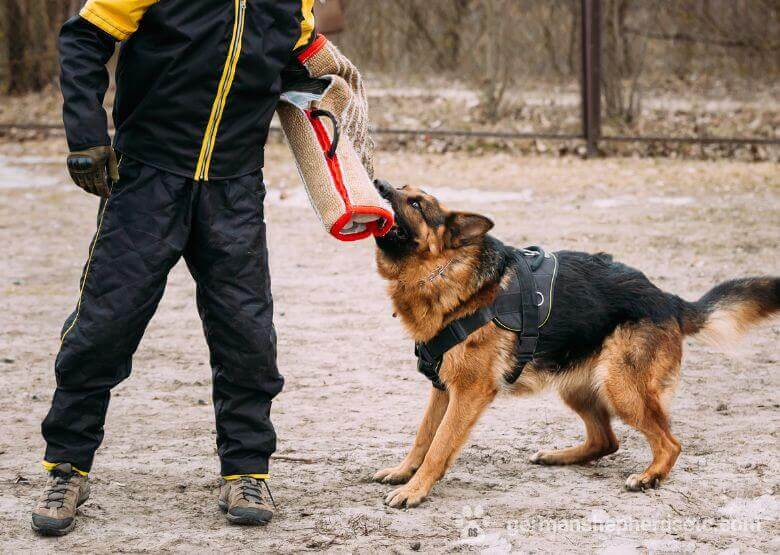
If your puppy nips you while playing, express your attitude with ‘ouch’ or any other reaction to pain. Don’t beat your pup or jerk your hand back because your doggy can consider it as a part of the game and continue. Take your hand away slowly and give the dog its favorite chew toy to bite instead. Always keep such toys at hand while playing with your pup in case it gets wild and decides to bite you.
Never encourage nipping and biting your hands. Your pet should understand that such playing is rough, and it does not have to do it anymore.
Always offer your little cutie a positive alternative to nipping and biting. Use the word ‘easy’ if it starts playing too roughly. When it stops biting you, give it a reward and verbal praise. Or you can stop playing yourself for a while and return later if your puppy continues nipping you.
- Physical Punishment Is Unacceptable
Physical punishment increases aggression. Moreover, kicking or hitting can injure your puppy. It causes stress and anxiety. If you want to discipline your little doggy, you should not intimidate it or use force. Moreover, punishment will ruin relationships with your pet. It will not trust you anymore but start avoiding you.
Constant anxiety can lead to health issues and more problematic behaviors. You can hurt your dog too, so it may need veterinary help. In addition, a young German Shepherd can bite and hurt you in response. This is a natural reaction aimed at self-defense.
- Right Communication Is Essential
Little puppies do not understand human language. They do not know words such as ‘Sit!’ or ‘No!’. However, they can react to your tone and gestures. That is why the correct tone and body language are vitally important. They should match the meaning you want to convey to your pet. Nevertheless, if your tone is threatening or intimidating, your little one starts fearing you.
Here are some examples of using the tone correctly. Suppose your young German Shepherd starts biting and tearing your shoes. Don’t scream or yell, but stand still and use the correct voice projection to say ‘Leave it!’ Replace your shoes with a chew toy and take them away.
Training commands also require a confident and happy tone. You can even bend to your puppy’s level to look more friendly and approachable to it.
- Patience Is the Key
If you are patient and consistent while training your German Shepherd puppy, you will soon see a lot of improvements in its behavior. Never give up if your doggy does not understand you at once.
Your pet is very intelligent, and it wants to please you. However, it will need a lot of your help and perseverance. If you feel tired and about to get angry, make a pause for a day or two. It will be more useful than trying to teach your puppy when you are stressed and frustrated.
Remember that your little German Shepherd needs some time to learn the rules or new commands. However, these dogs are very clever and intelligent, so your training efforts won’t be wasted.
- Accidents Sometimes Happen
Even well-trained puppies can occasionally have potty accidents. You may think that the pet has done it on purpose, but normally it never does. There should be some reason for this. So, try to find it instead of pushing your pet’s nose in its accident. The puppy may understand it as severe abuse, both physical and mental. So, you will never have a guarantee that it won’t do it again, but that time, purposefully.
You may try to change your doggy’s feeding and walking schedule to avoid indoor potty accidents. Make this new schedule clear for your puppy. Moreover, every member of your family should know this schedule to avoid similar accidents in the future.
- Recall Training Is Advantageous
When your puppy sees a lot of new and interesting things, you may be the last factor it is eager to consider. That’s why it is so important to establish close and stable bonds with your pet before you start recall training.
The first step on this road is avoiding punishments and intimidation. If your dog’s motivation to respond to your call outweighs its interest in something it is busy with at the moment, it will follow your commands obediently.
To respond to your call, the puppy should recognize you as a leader. It’s the natural instinct of all canines to follow their leader, so you can achieve this recognition by following these tips:
- Start your recall training by calling your puppy to different locations inside.
- Reward it with a tasty treat every time it comes to your call.
- Ask your family members to distract your puppy’s attention while you are calling it indoors.
- Move your little dog to the backyard on a long leash and do the same.
- Consider that it can be too distracted outside to respond to your call at once. Then, show the puppy its favorite treat and make several steps backward as if you invited your pet to follow you.
You can start recall training at a very young age to be sure that no discipline problems will emerge later on.
Training Timeline for Your German Shepherd Puppy
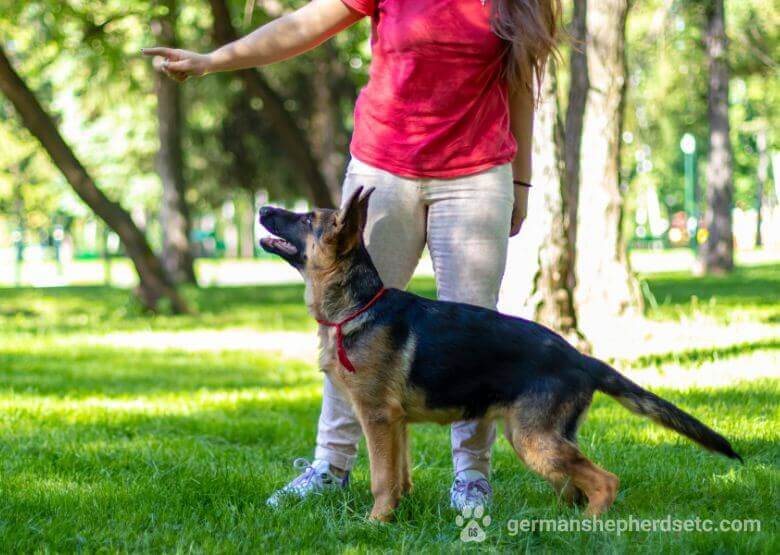
If you want to know how to train a German Shepherd puppy properly, you need to consider the timeline for every type of exercise and activity.
More about 6 week old GSD puppy training.
Weeks 8-12
All breeds of dogs have a very narrow socialization window – at 12-16 weeks of age. Socialization is very important for German Shepherds too because they are protective and helpful dogs by nature.
Puppies should learn by your reactions which people are friendly and which ones are dangerous. When you expose your puppy to different people in non-threatening situations, you will feel confident about your dog’s ability to distinguish between friendly and aggressive strangers.
You should also expose your puppy to different kinds of everyday routines related to unfamiliar people, such as grooming, and get them used to various grooming tools.
The second training goal at this age is crate training. This will help avoid the development of separation anxiety. Spending 5-10 minutes in a crate while being fed is very useful. Later on, the puppy can stay in a crate longer when you need to do your job or chores.
You should also pay attention to housetraining at this time. German Shepherds are very easy to housetrain when consistent supervision and regularity are provided.
More about 2 month old GSD puppy training.
More about 3 month old German Shepherd puppy training.
Months 3-9
At this age, it’s time to start obedience training. Your dog’s best working traits will display if early and constant training is provided. You can start with basic commands, such as ‘Sit!’, ‘Stay!’, or ‘Down!’, and then continue with walking on a loose leash.
You can also start recall training at this time. It takes more effort and patience on the part of an owner, but this skill is very useful because it may save both you and your dog one day.
You should also teach your puppy to control its impulses. German Shepherds are prone to problematic behaviors if not trained properly. The dog may engage in uncontrolled barking, chewing, digging, and chasing everything that moves. You need to teach your dog to focus on you as a leader and not to get easily distracted.
More about 4 month old German Shepherd puppy training.
More about 5 month old GSD puppy training.
More about 6 month old GSD puppy training.
Months 9-24
GS males reach their adulthood when they are 3 years old, while females become completely mature at the age of 2. However, the end of the second year of life is considered as the finish of puppyhood for both genders.
You should continue to teach impulse control, develop obedience skills, and get to more concentrated activities, such as agility, nose work, tracking, herding, and protection. The intense training of these skills should continue throughout the entire period. You also have to arrange the transition of your youngster from puppy to adult food meant for large breeds.
Basic German Shepherd Puppy Training
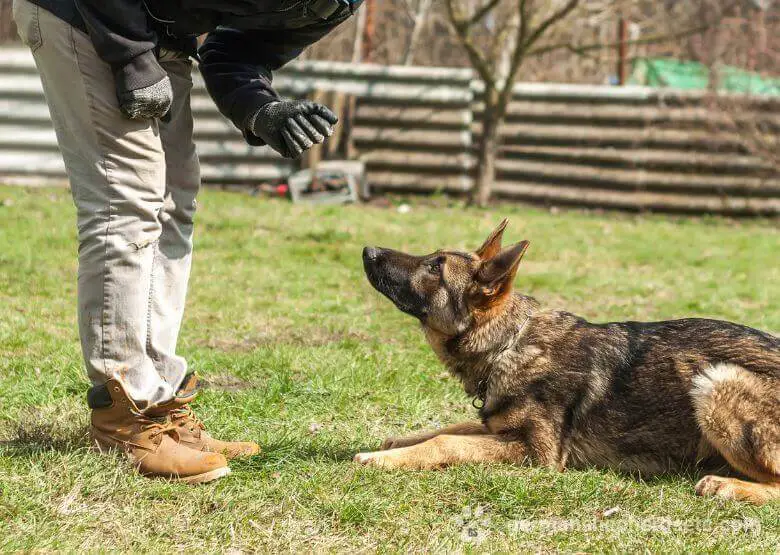
One of the most important things a puppy can learn isn’t where to go to the bathroom, but where not to go. According to some experts, insufficient house training or housebreaking is one of the most common reasons that dogs are relinquished to shelters. This is not surprising, because while house training is not a complicated process when housebreaking fails, the results can be disgusting.
Just as with children, dogs must be taught the proper place to eliminate. Strangely, though, some people believe that dogs automatically know that the potty is outside. Rather than simply hoping that your dog is one of the few who magically gets it right, there are a few simple steps that you can take to start your puppy training off on the right paw and keep your floors and furniture clean.
Two Steps to GSD Puppy House Training or Housebreaking
When you bring a new puppy into your home, you have transported him to a foreign land. He doesn’t know your language, your habits, or your expectations. If he could, he would probably just cut to the chase and ask where the restroom is. In fact, he probably did ask, but you missed it.
House training failures can almost always be attributed to the lack of two simple ingredients: scheduling and supervision. While it helps if you have realistic expectations, a little patience, and a sense of humor, you can housebreak your German Shepherd puppy if all you do is keep him in sight and take him out at regular, predictable intervals. Simple, right?
Unfortunately, what sounds simple often is not. We’re all busy, and watching a puppy day and night waiting for him to need to go to the bathroom is definitely not why we got him in the first place. We have jobs to attend, meals to cook, and movies to watch. Can’t the dog just let us know when he needs to go out? Yes, he can, if you show him how. It takes time and a little work, but it’s better than years of nasty cleanup.
Schedule Potty Breaks While Puppy Training
When a meeting is called at your place of work, you are typically given such information as where to meet, what the topic of the meeting will be, and when it will end. Armed with this knowledge, you can stop by the powder room on the way to the meeting, feeling confident that all is well. However, if you were called to an urgent meeting with no chance to take a break beforehand and no idea when the meeting would end, how long could you “hold it?”
You put your puppy in this position every time he needs to go out if you don’t set up a schedule for him. Obviously, there will be times when you need to take him out before the scheduled moment arrives, especially in the beginning, but when he can rely on you to take him out to go potty at certain times or after specific events, he will begin working at holding it until the appointed time. For example, always take your puppy out first thing in the morning, not after coffee, and not after checking your email or chatting with your friends on Facebook. Take him out first thing.
Next, take him out after he eats. Puppies need to go out after every meal, so don’t let him down. He also needs to go out after any period of time that he has been left home alone. If you are away from home at work, school, or shopping, take him out the moment you get back. If you don’t, you’ll spend that walking time cleaning up instead. Once your GSD puppy learns that he gets to go out as soon as you get up, after every meal, and as soon as you get home, he will know that you aren’t going to leave him hanging and hurting trying to figure out when’s the next potty break.
Freedom is Overrated
Until your German Shepherd puppy training is complete, and your puppy is reliably house trained, you will increase the speed of his success the more you decrease the number of accidents. This means that you must keep your eye on him all the time because you need to be there to act when it’s time for him to go out. You already know that you must provide him with a consistent schedule, but not every potty break can be dictated by the clock. When you observe your puppy sniffing the floor, circling, arching his back, lifting his tail, or just whining for no apparent reason, get him outside quickly.
During those times when you cannot watch him, you must confine him. You must. You cannot leave him free to roam your house and use it as a bathroom. Furthermore, you can place him in a crate, lock him in a safe room, use a playpen, or whatever works for you, but you must confine him. If you have a safe yard where he can wander at will, that’s OK, too. Just do not give him free access to your home.
Consistency Equals Success
Most house training failures are not the fault of the dog. We get busy, we have unrealistic expectations, and we expect dogs to read our minds and know what we want without training. Really, though, it all comes down to scheduling and supervision. If you can remember these two simple things, you can housebreak your dog.
All youngsters need training, whether they are puppies, ponies, or children. This is not news. We send our children to school for a good many years before we consider them trained. Fortunately, dogs don’t take as long.
GSD puppy training itself is not difficult. Dogs are smart. German Shepherds are especially smart because we have bred them to be independent thinkers. They love a job, and they love puzzles. This means that training can either be easy or frustrating. It is frustrating if your dog seems to be smarter than you are, which he will indicate to you through his bored body language and lack of attention span. It is easy if you know the key to really successful training.
When we think of puppy training, we envision teaching the dog things like sit, down, stay, walk on the leash, and fill in the blank. Teaching each discreet command one at a time does work, and you’ll get acceptable results if you approach training this way, but wouldn’t it be awesome if you could essentially teach your dog to train himself? The secret that all great dog trainers have figured out is how to ignite that love of learning that dogs carry deep inside. Get ready to open up a whole new world of possibilities.
From the outside, enlightened training looks like any other training in the beginning. Your puppy has to learn the concept first. You start with very simple steps and build from there.
Before any learning can happen, you have to get your puppy’s attention.
Getting Your Puppy’s Attention
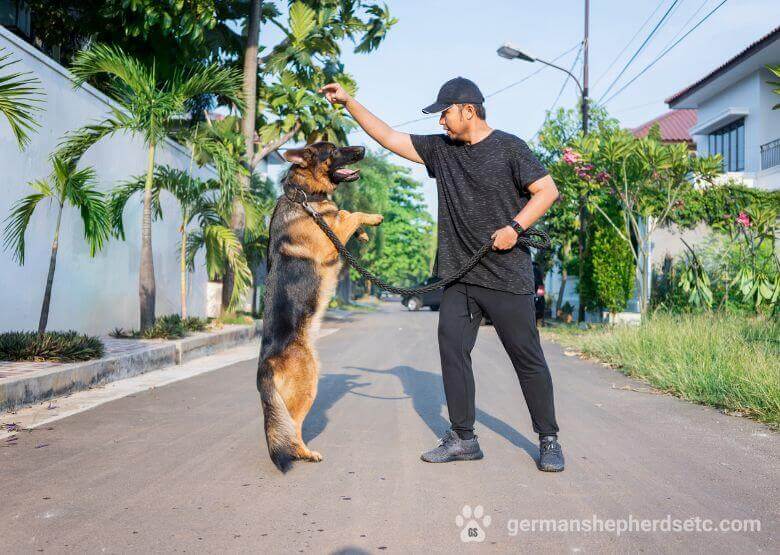
The goal of this puppy training exercise is to condition your puppy to always look at you when you call his name. Get a handful of healthy treats that your puppy loves. In a quiet area with minimal distractions, approach your puppy and call his name. If he looks at you, say “Yes!” and give him a treat. If he doesn’t look at you, wave your hand in front of his nose, so he can smell the treats, then say his name again. If he is focused on the treat but is more or less looking in your direction, say “Yes!” and give him the treat. Do this five times in a row, several times a day for two days. If your puppy is a genius, and if he is a German Shepherd the chances are high that he is, do the exercise anyway several times per day as described. The point is to establish a conditioned response so that every time you say your puppy’s name, he is conditioned to look for a reward. Eventually, you can transition from using treats to simply praising him when he gets it right, but for now, use treats.
To clarify one point, your puppy is not born speaking English. You can use whatever word you choose to let him know when he has done what you are asking him to do. You can say “Good!” or “Awesome!” in place of “Yes!” The word isn’t important; its meaning is. This is the marker you will use throughout his lifetime to let him know when he has performed on cue correctly. Be consistent. If you say “Good!” one time and “Yes!” the next, your dog will be hearing “Maybe!”
Once your puppy has learned to expect a treat when you call his name, it’s time to introduce the final step of this exercise, which is getting him to look you in the eye when you call him, not look at your hand for a treat. You do this initially by luring his eyes to your eyes with your hand that is holding the treats. Call his name, bring your treat hand up to your face, and the instant your puppy makes the slightest eye contact, reward him. Do this several times, then move your hand a few inches away from your face. Call his name, and when he looks at your hand for a treat, do not give it to him. He will become confused, and at some point, he will look you in the eye for clarification. Instantly reward him.
Practice this several times a day for a few days, gradually moving your hand away from your face until eventually, it is in a normal relaxed position by your side while your puppy looks at your face when you call him. When you have mastered this exercise, you are ready to move on.
How to Train a German Shepherd to Sit
Now you can accelerate your puppy’s love of learning using something as commonplace as teaching him to sit on cue. First, you will lure him into position like you did when you brought his eyes to your face, then you will transition to having him sit when no treat is offered.
With your puppy standing next to you, call his name. Praise him when he looks at you, but do not give him a treat. Instead, place your hand holding the treat in front of his nose and lift your hand directly over his head. At the same time, say “Sit!” Do not touch your puppy to position him. Do not pull his head up with his leash, and definitely do not push his butt down to force him to sit.
Let him work this out on his own. He doesn’t know what this new game is, and he doesn’t know what the word “sit” means, but eventually, he will get tired of staring up at the treat, and he will sit on his own. Instantly say “Yes!” and give him the treat. Step away, call him to you, and repeat. Faster than you expect, he will drop his butt to the floor on cue and proudly accept his reward.
As soon as your puppy will reliably sit when you give him the cue and lift your hand over his head, give him the cue but keep your hand at his side. Don’t help him. Wait for him to work it out. If he gets frustrated and loses interest, show him the treat and try again. Eventually, he will sit without needing you to guide him, at which point you will lavishly praise him and move on to the next lesson.
Teaching Your GSD Puppy Down Command
With your puppy sitting, show him the treat, then lower your hand to the floor and slowly out in front of him as you say “Down!”. Do not push him down, do not pull his front legs out from under him. Wait for him to lie down on his own. If he stands up to get the treat, have him sit again and start over. Eventually, he will lower his front end to the floor. Instantly praise him and give him the treat.
Once your puppy will lie down consistently when you cue him and lure him with the treat, give him the cue and wait for him to lie down without showing him the treat. You may have to go back to luring him a time or two, but because you taught him how to learn on his own, eventually he will get it.
The same techniques of puppy training can be applied to anything you want to teach your dog to do.
FAQ
Are German Shepherds easy to train?
German Shepherds are smart and hard-working dogs. They are highly intelligent and therefore rather easy to train. But, it requires clear objectives and loving guidance. When consistent supervision and routine are provided, German Shepherds are very simple to house train.
When should you start training a German Shepherd puppy?
Many people will advise you against starting a German Shepherd puppy’s training until it is between 8 and 12 weeks old because it is too early. However, it is not. It may sound too harsh, but training should begin as soon as a puppy enters your home. In fact, training will yield better results the younger your puppy is.
How to train a German Shepherd puppy not to bite?
Use a clicker, for instance, to divert the puppy’s interest. It’s a tool that emits a click sound. Your puppy has to learn that when he hears the click sound, he has acted improperly and should stop. For instance, the puppy may begin biting the owner’s legs, but as soon as the click is heard, the dog immediately retreats. To help the dog learn that he is responding correctly, the owner should reward him with a treat. Learn more about training your GSD not to bite.
How to potty train a German Shepherd puppy?
As soon as your German Shepherd puppy enters your home, you should begin potty training. If your puppy dog understands that it shouldn’t go potty inside right away, it won’t ever form a terrible habit that is tough to break. Based on your puppy’s physiological requirements, you must establish a schedule for its “go potty” behaviors. For instance, it must be relieved after eating, sleeping, and waking up after a daytime nap. It might also need a potty after playing. Your puppy dog will pick up the rules fairly fast with the help of the routine. Learn more about GSD Puppy potty training.
How to train German Shepherd puppy at home?
Failures in house training can almost always be attributable to a lack of two basic components: scheduling and supervision. You can housebreak your German Shepherd puppy if all you do is keep him in sight and take him outside at regular, predictable intervals, though it helps if you have reasonable expectations, a little patience, and a sense of humor.
Final Thoughts
German Shepherds belong to the breed that benefits and thrives from continuous extensive training. Your puppy should know how to behave properly in different situations and in both outdoor and indoor environments. That is why it is so important to start German Shepherd puppy training as early as possible.
Actually, you need to expose your little pup to some rules, exercises, and practices from the very first minutes in your home. As a result, you will get a loyal, obedient, protective, and intelligent friend and partner for all your further activities.
